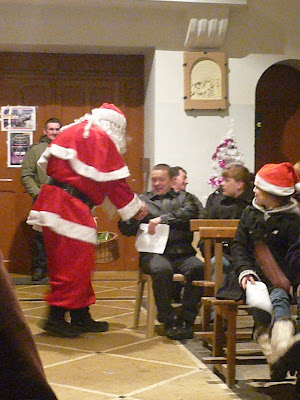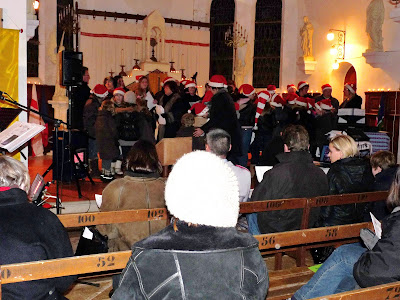















It began snowing in Germany on the Thursday, then in France on the Somme on Friday. PANIC STATIONS!!!
This meant that Wolfgang and Gaby couldn't get out of Dortmund.
It snowed on the day of the Christmas Truce Carol Service. More panic. Mr Frédéric Pelletier, always one to err on the side of caution, advised me to cancel the event. WHAT! after all our hard work? After all the money spent so far? (by myself I add - there are no subsidies)
After all our rehearsals in the cold? No we can't - I thought. If the soldiers could sing carols in snow-filled trenches, we can sing carols in a church surrounded by snow. I'll improvise I said to myself.
But I didn't need to.
If organising four yearly Christmas Truces has taught me one thing it is that I have had the humbling pleasure of knowing and working with some really delightful and loyal people. I was amazed at who managed to turn up. Braving the snow and ice and slippery roads, they made their way to Pozières and stuck around for both the musical Truce and the Truce buffet in the Tommy.
We were sad not to see the orchestra from the Combles district and many of the children from the Notre Dame Primary School in Bapaume; but it wasn't going to stop us.
We started off with a couple of videos projected onto the ceiling, most notably Man in the Mirror with its very thought-provoking images. The pipers, dressed in magnificent costumes bought especially for the Truce, entered the church playing I'm Dreaming of Home from the Film based on the Truce. This year the film-producer's cousin was in the church, so maybe she will give us some good publicity. The 2010 Christmas Truce Carol Service had begun.
A roller coaster of emotions and experiences was launched. From the solemnity of Stille Nacht and Entre le boeuf et l'âne gris we moved over to the speedier rhythm of Deck the Halls, Mary's Boy Child (Boney M version), I believe in Father Christmas and the rocking 99 Luftballons whose inclusion was incredibly timely. The song describes the cold war tension between the former two Germanies; a situation echoed by events in North and South Korea at this very moment in time. Our balloons didn't get any higher than the ceiling in the church but it was a fascinating sight for the children present. They were also given treats by our piper santa Jean-Luc SAINT, who went about giving everyone sweets during the service. Bless his cotton sockettes.
Powerful images of despair and hope and of war and peace were projected onto the ceiling. The feel-good story of 2010 was celebrated in this way with the release of the Chilean miners. This story reminds us of human solidarity and cooperation in adversity. The man of the hour was Manuel Gonzalez: the rescuer who volunteered to go down into the mine to help prepare the miners for their ascension. He was left alone down there after the rescue and was the very last to leave the underground prison. He was wise enough to tell the Chilean President that this should never happen again. Sadly 29 miners in New Zealand perished underground just before our Truce. Lessons need to be learned.
So many people deserve thanks for their work to make the Truce a success. I am indebted to so many people. They know who they are! They provided the music, the voices, the dance routine... the sound system. They also travelled difficult roads to get to Pozières, some coming from Lille and England.
A special thanks to Dominique Zanardi who lets us use the Tommy free of charge. His contribution is immense.
The photos attached to this article were taken by Nadia, Cathy Destarkeet, Claudie Llewellyn and Philippe Duban - merci à vous!
Who knows what will happen in 2011! I am thinking of buying a 4x4! Perhaps we all should.
BY PAULA FLANAGAN






















